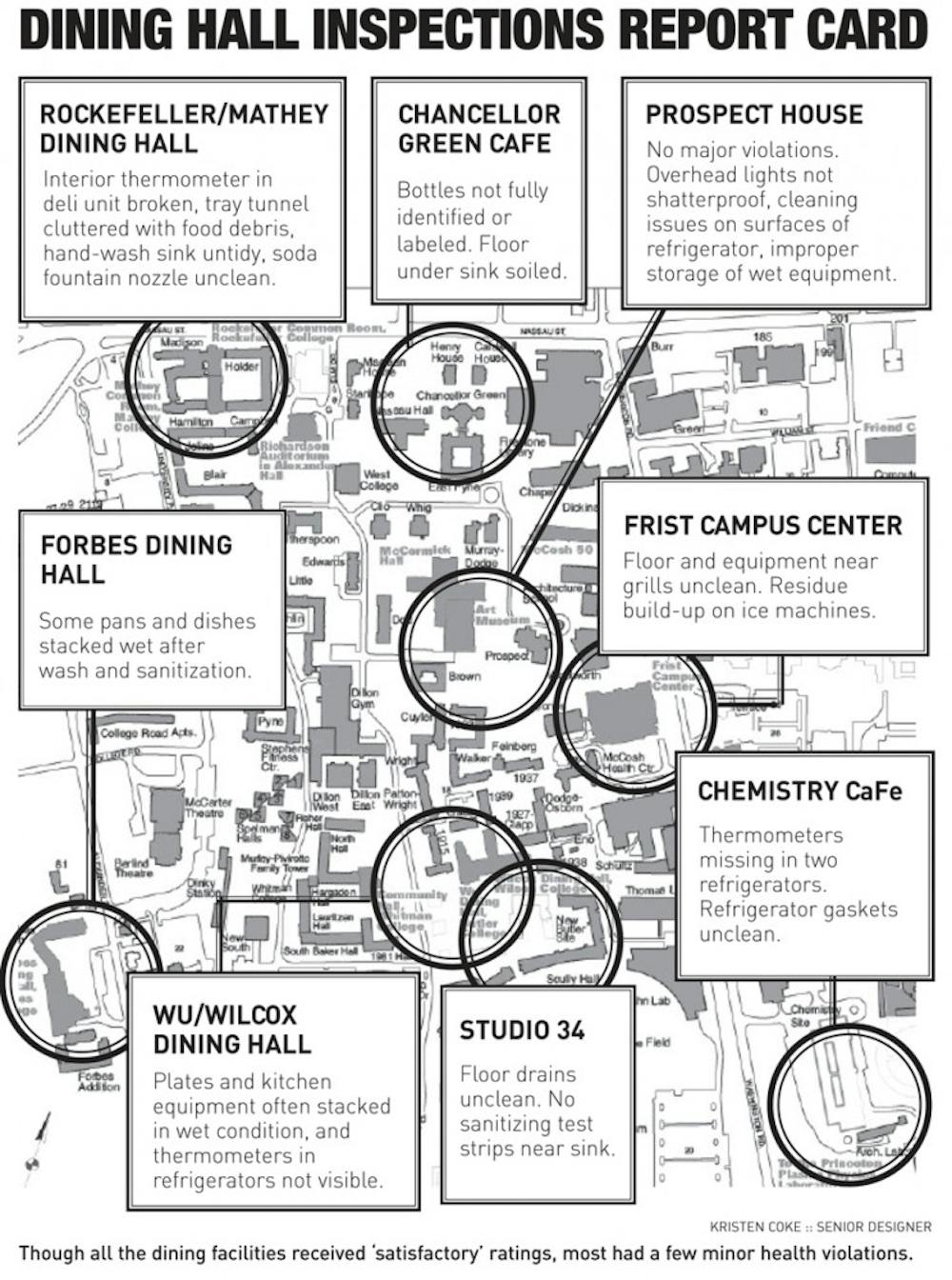Princeton’s dining facilities have reported numerous minor health violations, despite receiving overall “Satisfactory” ratings, according to a review of health records covering the past three years.
The records, obtained through New Jersey’s Open Public Records Act, show that more than half of the University dining facilities used dining equipment that was in violation of health protocols, including soiled can-openers, debris-filled tray tunnels and kitchen drains in disrepair.
More than half of the facilities also had violations with regards to the maintenance of kitchen floors or walls and the protection of food against contamination. Inspectors found soiled soda nozzles, moldy ice machine surfaces and other possible food hazards in the facilities.
Two violations due to pests were reported in 2010, the first of which was the finding of mice droppings in the University Bake Shop and the second being a mice entry point leading to the outside of EQuad Cafe.
Dining hall student workers said that they were usually comfortable with the health guidelines followed, although there were mixed opinions about the quality of the dishwashing procedures. The students were granted anonymity to freely discuss their jobs without jeopardizing their posts.
University dining facilities are inspected annually by the Princeton Regional Health Department. The reports outline 52 criteria and stipulations that facilities are required to follow according to New Jersey regulations. Specific comments are also written by the inspector in a final section.
The health inspection records report no major violations of dining health protocols. Executive chef of the University’s Dining Services, Robert Harbison, said the University’s dining facilities are absolutely safe and dedicated to making food safe for people to consume.
“For example, the state requires that any retail or food service operation has one certified food safety manager per operation,” Harbison said. “A year or two ago, we sent all of our managers for certification process, and so now, rather than having one per unit, we have multiple safety managers per unit, and it’s kind of unique.”
Harbison added that Dining Services’ primary health concern lies in preventing any cross-contamination. The University follows a procedure known as Hazard Analysis and Critical Control Points, he said, a program developed by NASA as a way to monitor potentially hazardous foods by examining the food and its storage temperature.
Student Dining Hall Worker Training
There is a lack of a clear and systematic training system, students interviewed said.

In addition, depending on which college dining hall they work and what time of the year they begin to work, student workers seem to receive different amounts of training.
A female student worker at the Wu-Wilcox dining hall shared between Butler and Wilson College recalled that on her first day of work, no one, including the student manager or the professional staff, had told her to wear gloves when cleaning the dishes.
“Obviously that’s a huge problem because you’re supposed to use gloves, and I see so many workers just putting away dishes that all of the students and workers touched, and they’re not wearing gloves,” she said.
At the beginning of each year, Dining Services gathers student workers to provide some basic training, Harbison explained. However, students still have the option to join throughout the year.
“We rely on the student managers if there are any shift changes or if there are any new people to pick up on that training a little bit better,” he said.
He added that the University doesn’t require student workers to participate in any health department-specific trainings. When asked whether it is safe to hire student workers, Harbison said that most of the food outbreaks occur during the food preparation and handling, something student workers are not involved in.
“Most of the student workers that we’ve hired aren’t doing the food preparation. Most of the time when there is a food outbreak, it’s due to those type of improper food handling, and because we have professionals that are trained, Princeton hasn’t had issues of improper food handling— perfect track record.”
Another student, who is a Wu-Wilcox manager said there was not much training involved in become a dining hall worker.
“You just show up, and you learn doing the job,” the student said.
However, a male student worker at Forbes dining hall said he had received rigorous training which had helped him become more adept at working in the dining halls. Because working at the dining halls require workers to perform wide range of tasks, such as mopping and sweeping, replacing food, putting up dishes and replacing drinks, he said that his training proved to be crucial.
“There is a lot that goes on in the kitchen and the servery, so when you first get trained to do all that stuff, it is somewhat of a learning curve,” he said. “I think that at the beginning, they do provide sufficient training because the managers are very, very helpful.”
The majority of student workers are assigned to help with the dishwashing process. While some assist in cleaning the plates and making sure they properly go into the dishwasher, others are responsible for checking that the plates and utensils that come out are free of any food debris or leftovers.
“From my perspective, picking [utensils] up from the ground and putting it back is a problem, and the quality control as far as dishwashing goes is very questionable and there’s definitely a lack of sanitization and attention to details when putting dishes away,” the female student worker in Wu-Wilcox said.
“It is true that sometimes dishes come out are not 100 percent clean, so it’s up to the person unloading to check each dish and sometimes dishes have to go through it twice,” said a student manager at Wu-Wilcox. “When they come out, someone is there to unload them, and part of their job is to check and see if they need to be cleaned again.”
A student manager at Rockefeller-Mathey dining hall said that dishes are often coming out of the dishwashing machine with food debris still left on the plates and utensils. The student manager added that this happens about two or three times every meal.
While there might often be dried food debris left on plates, the student manager assured that the plates are still sanitary. “It’s unfortunate when that happens, but it’s gone through a machine at a really high temperature. There are not any germs with these plates. It just looks gross.”
For Harbison, it is difficult to inspect every single utensil that is washed, although they take care in making sure all the washing machines are up to date with maintenance.
“If you look at the volume of washing we do, it’s challenging to inspect every knife, every plate, every coffee cup, every glass and every spoon. It’s challenging to do that so the machines are checked, and you’ll see that on the maintenance log.”
Residential college dining facilities
Wu-Wilcox and Rocky-Mathey dining halls, two of the busiest dining facilities serving the largest portions of the student body, had the greatest number of minor violations in the past three years.
The most common violation was not having functional or visible thermometers within their refrigerating unit.
In Wu-Wilcox, the most recent 2012 health records reported that a few of the thermometers in a few refrigerator units were either not visible or missing. This issue was also evident in the 2011 record where the counter refrigerator thermometer was noted to be broken.
Harbison explained that the reason for these marked-up violations was due to the University’s precautionary measures to install additional hanging thermometers in every refrigerator unit.While the refrigerators do have built-in, interior thermometers, he said, the University takes further measures by hanging a thermometer inside each refrigerating unit to provide a more accurate measurement. However, the thermometers often fall to the ground and break when food is being pulled in and out of the refrigerator, Harbison said. According to Harbison, these are essential for maintaining the right temperature to prevent bacterial growth in the food.
Dining Services recently requested a new shipment of hanging thermometers, Harbison said.
Other minor violations in Wu-Wilcox were the torn door gaskets in the refrigerators and stacking of kitchen equipment that was still wet.
Rocky-Mathey had similar violations with regard to thermometers in refrigerating units. Minor issues were observed in tray tunnels cluttered with debris, dirty hand-sinks in the kitchen and unclean soda fountain nozzles.
The University Bake Shop, located in the basement of Rocky-Mathey dining hall, saw instances of mice droppings in 2010, although they have not been reported more recently.
“The buildings are several decades old, and they are not sealed up like modern buildings,” Harbison said. “For instance, we don’t have any of those issues at Whitman College. We don’t have those issues at Frist Campus Center.”
He explained that while Dining Services does sometimes encounter pest problems with insects, birds, squirrels and field mice, the company the University uses for pest control does a good job of identifying and correcting the issue.
“The building is believed to have tunnels that go into town onto Nassau Hall to other areas throughout campus, and those tunnels have penetrations all over the building and it’s really challenging,” Harbison said. “We don’t use chemical pest methods, and we don’t try to kill them with pesticides or anything like that.”
Forbes College received one minor violation for stacking kitchen equipment in wet condition. Forbes had a similar thermometer issue, but it was corrected on-site.
Although health inspection reports for Whitman College were not available, Harbison noted that Whitman’s rather new construction has prevented it from seeing the same kind of pest problems found in the Rocky-Mathey dining halls.
The Graduate College dining hall received minor violations for not having thermometers in the salad bar and having soiled soda nozzles. Besides this, the inspector noted that the Graduate College was well-maintained.
University cafes
The eating counter in Jadwin Gymnasium had mold and residue building up in the ice machine and refrigerators, past reports said. However, the October 2013 inspection found no violations in Jadwin.
Last year, the kitchen in Studio 34 was reported to have floor drains that were unclean and compartment sinks that did not have sanitizing test strips in them. The previous two years, Studio 34 did not have any recorded violations.
The EQuad Cafe also received similar minor corrections, with mops being incorrectly hung and cleaning issues under the three compartment sinks. In 2010, a mice entry point was identified leading to the outside of the Cafe, an issue that was immediately addressed by the University.
Chancellor Green Cafe also received minor violations in its most recent 2012 report. These included spice bottles that were either missing labels or had incorrect labels. Furthermore, inspectors observed that the floor drain under the kitchen sink was also soiled.
Genomics Cafe, located in Carl Icahn Laboratory, had no minor violations in the past two years.
The only minor violation that Frick Chemistry CaFe had was the missing thermometers in two of its refrigerators.
Frist Campus Center and Prospect House
Prospect House, a private dining facility for faculty and staff of the University, received minor violations in this year’s report. Kitchen equipment was often stacked together in wet conditions, and crusty surfaces were observed in the bulk-storage containers. The improper maintenance of garbage and litter was corrected on-site.
Violations that were listed in the 2012 reports, such as the cluttering of the garbage area, kitchen floors in disrepair, soiled sinks and minor temperature control issues, were not seen in the 2013 report.
Frist Campus Center, where students go for Late Meal, had a few minor violations in the past few years. Like other dining facilities, a few of the refrigerating units were missing interior thermometers, an issue that was corrected on-site. Further, the grill was not kept clean and the cooking utensils were also found to be dirty. Certain mold build-ups were also identified in the ice machines.








